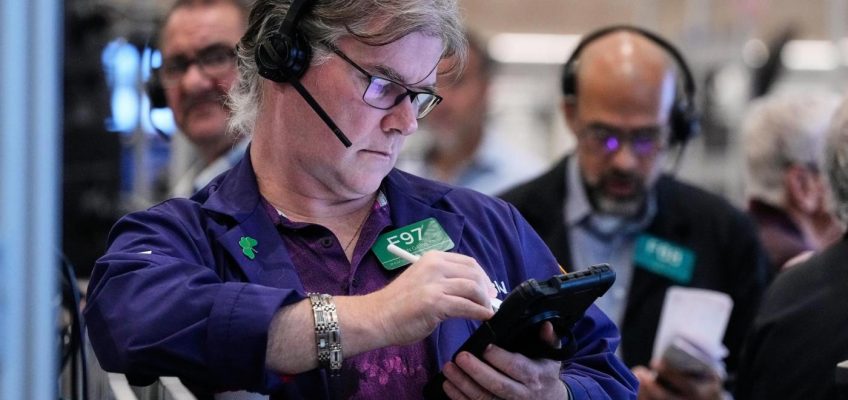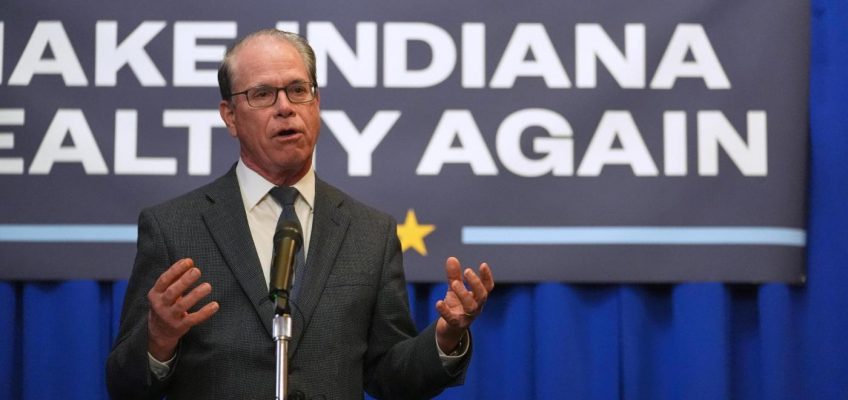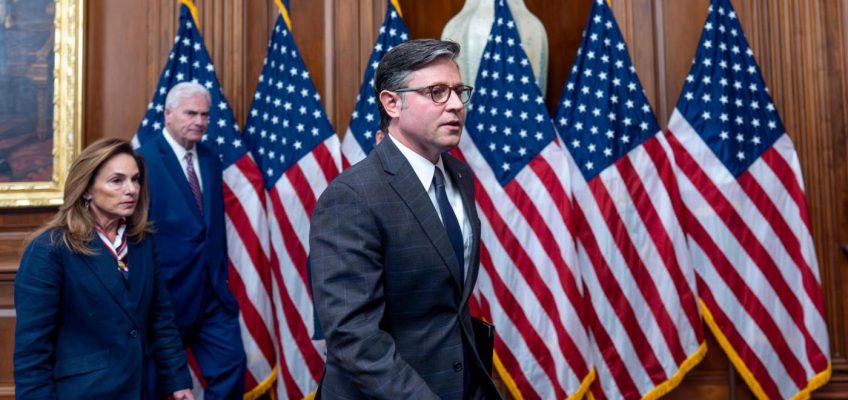By JOEY CAPPELLETTI and ALI SWENSON, Associated Press
WASHINGTON (AP) — The first caller on a telephone town hall with Maryland Rep. Andy Harris, leader of the House’s conservative Freedom Caucus, came ready with a question about the Affordable Care Act. Her cousin’s disabled son is at risk of losing the insurance he gained under that law, the caller said.
Indiana Gov. Mike Braun calls a special session to redraw the state’s congressional boundaries
Biden calls these ‘dark days’ as he urges Americans to ‘get back up’
For Japan’s new leader, the key to connecting with Trump could be a Ford F-150 truck
US, China tee up sweeping trade deal for Trump, Xi to finish
Democratic Gov. Gavin Newsom of California says he’ll consider presidential run after 2026 midterms
“Now she’s looking at two or three times the premium that she’s been paying for the insurance,” said the woman, identified as Lisa from Harford County, Maryland. “I’d love for you to elucidate what the Republicans’ plan is for health insurance?”
Harris, a seven-term Republican, didn’t have a clear answer. “We think the solution is to try to do something to make sure all the premiums go down,” he said, predicting Congress would “probably negotiate some off-ramp” later.
His uncertainty reflected a familiar Republican dilemma: Fifteen years after the Affordable Care Act was enacted, the party remains united in criticizing the law but divided on how to move forward. That tension has come into sharp focus during the government shutdown as Democrats seize on rising premiums to pressure Republicans into extending expiring subsidies for the law, often referred to as Obamacare.
President Donald Trump and GOP leaders say they’ll consider extending the enhanced tax credits that otherwise expire at year’s end — but only after Democrats vote to reopen the government. In the meantime, people enrolled in the plans are already being notified of hefty premium increases for 2026.
As town halls fill with frustrated voters and no clear Republican plan emerges, the issue appears to be gaining political strength heading into next year’s midterm elections.
“Premiums are going up whether it gets extended or not,” said GOP Sen. Rick Scott. “Premiums are going up because health care costs are going up. Because Obamacare is a disaster.”
‘Concepts of a plan’
At the center of the shutdown — now in its fourth week with no end in sight — is a Democratic demand that Affordable Care Act subsidies passed in 2021 be extended.
Trump has long promised an alternative. “The cost of Obamacare is out of control, plus, it’s not good Healthcare,” he wrote on Truth Social in November 2023. “I’m seriously looking at alternatives.”
Pressed on health care during a September 2024 presidential debate, Trump said he had “concepts of a plan.”
But nearly 10 months into his presidency, that plan has yet to come. Dr. Mehmet Oz, administrator of the Centers for Medicare and Medicaid Services, told NBC on Wednesday, “I fully believe the president has a plan,” but didn’t go into details.
Centers for Medicare & Medicaid Services administrator Dr. Mehmet Oz listens as President Donald Trump speaks in the Oval Office of the White House, Thursday, Oct. 16, 2025, in Washington. (AP Photo/Alex Brandon)
Republicans say they want a broader overhaul of the health care system, though such a plan would be difficult to advance before next year. Party leaders have not outlined how they’ll handle the expiring tax credits, insisting they won’t negotiate on the issue until Democrats agree to end the shutdown.
A September analysis from the nonpartisan Congressional Budget Office estimated that permanently extending the tax credits would increase the deficit by $350 billion from 2026 to 2035. The number of people with health insurance would rise by 3.8 million in 2035 if the credits are kept, CBO projected.
Asked Wednesday on CNN whether Republicans have a plan to address the subsidies if the government reopened, House Speaker Mike Johnson said they had “proposals” that can be “ready immediately.”
“It’s a very complicated, very complex issue, that requires a long time to build consensus around,” he said.
A growing political issue
With notices of premium spikes landing in mailboxes now and the open enrollment period for Affordable Care Act health plans beginning Nov. 1, the political pressure has been evident in Republican town halls.
In Idaho, Rep. Russ Fulcher told concerned callers that “government provided health care is the wrong path” and that “private health care is the right path.” In Texas, freshman Rep. Brandon Gill responded to a caller facing a sharp premium increase by saying Republicans are focused on cutting waste, fraud and abuse.
Harris echoed a message shared by many in his party during his Maryland town hall, saying costs are “just going back to what it was like before COVID.”
But the number of people who rely on Affordable Care Act health insurance has increased markedly since before the pandemic. More than 24 million people were enrolled in the marketplace plans in 2025, up from about 11 million in 2020, according to an analysis from the health care research nonprofit KFF.
Sara from Middleville, Michigan, told Rep. John Moolenaar during his town hall that if health insurance premiums go up by as much as 75%, most people will probably go without heath care. “So how do you address that?” she asked.
Moolenaar, who represents a district he handily won last year, responded: “We have time to negotiate, figure out a plan going forward and I think that’s something that could occur.”
Some Republicans have shown urgent concern. In a letter sent to Johnson, a group of 13 battleground House Republicans wrote that the party must “immediately turn our focus to the growing crisis of health care affordability” once the shutdown ends.
“While we did not create this crisis, we now have both the responsibility and the opportunity to address it,” the lawmakers wrote.
Some Republicans dismiss projections that ACA premiums will more than double without the subsidies, calling them exaggerated and arguing the law has fueled fraud and abuse that must be curbed.
Many Democrats credited their ability to flip the House in 2018 during Trump’s first term to the GOP’s attempt at repealing Obamacare, and they’re forecasting a similar outcome this time.
About 4 in 10 U.S. adults say they trust the Democrats to do a better job handling health care, compared with about one-quarter who trust the Republicans more, a recent AP-NORC poll found. About one-quarter trust neither party, and about 1 in 10 trust both equally, according to the poll.
A looming internal GOP fight
Even as GOP leaders pledge to discuss ending the subsidies when the government opens, it’s clear that many Republican lawmakers are adamantly opposed to an extension.
“At least among Republicans, there’s a growing sense that just maintaining the status quo is very destructive,” said Brian Blase, the president of Paragon Health Institute and a former health policy adviser to Trump during his first term.
Michael Cannon, director of health policy studies at the libertarian Cato Institute, said he’s working with multiple congressional offices on alternatives that would let the subsidies end. For example, he wants to expand the Affordable Care Act exemption given to U.S. territories to all 50 states and reintroduce a first-term Trump policy that gave Americans access to short-term health insurance plans outside the Affordable Care Act marketplace.
Cannon declined to name the lawmakers he’s working with, but said he hopes they act on his ideas “sooner than later.”
David McIntosh, president of the influential conservative group Club For Growth, told reporters Thursday that the group has “urged the Republicans not to extend those COVID-era subsidies.”
“We have a big spending problem,” McIntosh said.
“I think most people are going to say, OK, I had a great deal during COVID,” he said. “But now it’s back to business as usual, and I should be paying for health care.”
Swenson reported from New York.




